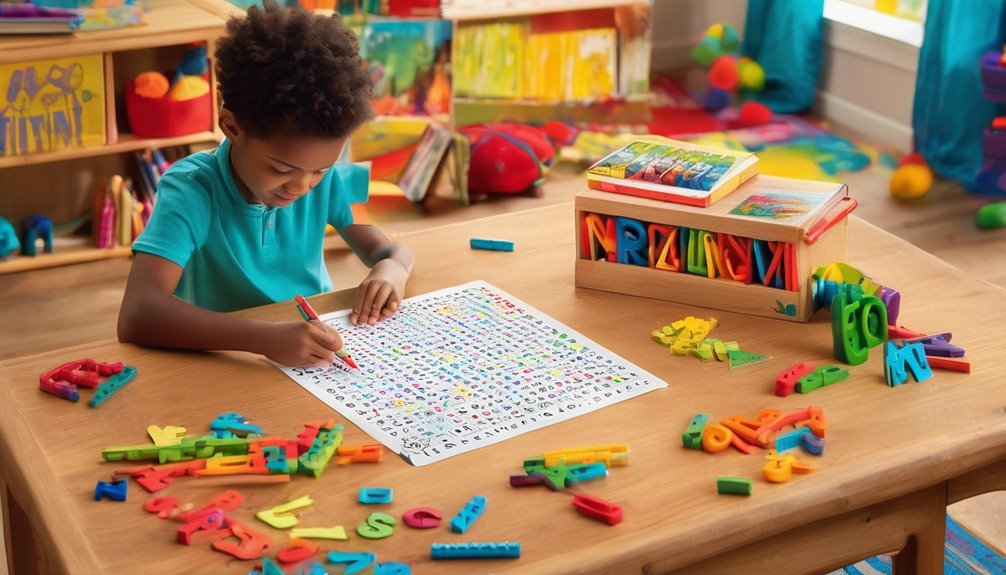If you’re looking for a way to engage your child in literacy, word search games can be a great start. These puzzles not only introduce new vocabulary but also make learning enjoyable. By selecting themes that resonate with your child’s interests, you can spark their curiosity. But how do you choose the right puzzles and create an inviting atmosphere for this activity? Let’s explore the best strategies to get your child excited about this learning tool.
Key Takeaways
- Start with simple word searches tailored to the child’s reading level to build confidence and interest in reading.
- Choose engaging themes like animals or fairy tales to capture the child’s attention and make learning enjoyable.
- Work on puzzles together, encouraging collaboration and celebrating new word discoveries to enhance motivation.
- Incorporate word searches into daily routines, such as during breakfast or bedtime, for consistent practice and bonding time.
- Create a cozy and colorful learning environment that fosters excitement and curiosity about words and reading.
Understanding the Benefits of Word Search Games

Word search games can be a fun and engaging way to boost your reading skills. As you search for words, you sharpen your focus and enhance your ability to recognize patterns in text. Each completed puzzle not only brings a sense of accomplishment but also expands your vocabulary.
You might discover new words that pique your interest, sparking a desire to learn more. Plus, these games often improve your memory, helping you recall words more easily later on. They’re a delightful way to unwind while still nurturing your brain.
Choosing the Right Word Search for Your Child
Selecting the right word search for your child can enhance their reading experience even further. To ensure you pick one that captivates and engages, consider the following:
- Age Appropriateness: Choose puzzles that match your child’s reading level and interests.
- Theme Variety: Look for word searches featuring themes your child loves, like animals, space, or fairy tales.
- Difficulty Level: Start with simpler puzzles to build confidence, gradually increasing the challenge as they improve.
- Visual Appeal: Opt for colorful and fun designs to make the activity more inviting and enjoyable.
Tips for Introducing Word Searches to Young Readers

Introducing word searches to young readers can be a fun and engaging way to boost their vocabulary and reading skills. Start by choosing a theme they love—animals, space, or their favorite cartoons. This connection makes it exciting for them.
Sit down together and explore the puzzle, guiding them through the process. Encourage them to circle words they recognize and cheer them on when they find new ones. Make it a game by timing how fast they can find all the words or competing with family members.
Keep the atmosphere light and playful, so they associate word searches with joy rather than pressure. Remember, your enthusiasm will inspire them to explore more and develop a lifelong love for reading!
Creating a Fun Learning Environment
Creating a vibrant and inviting space can significantly enhance the learning experience for young readers. When you set the stage for fun, it makes engaging with words exciting.
Here are some simple ideas to create that perfect atmosphere:
- Cozy reading nook: Set up a small corner with cushions and blankets for a comfortable reading spot.
- Bright visuals: Use colorful posters or artwork that sparks curiosity about words and stories.
- Interactive elements: Incorporate word search games or letter puzzles on walls for playful exploration.
- Personal touches: Add your child’s artwork or favorite books to make the space feel special and unique.
Incorporating Word Searches Into Daily Routines

As you weave word searches into your daily routines, you’ll not only boost your child’s vocabulary but also make learning enjoyable.
Start simple; maybe during breakfast, you can have a quick word search ready. It transforms a regular meal into a fun learning moment.
You could even turn waiting times into opportunities—while waiting in line or at an appointment, pull out a word search. Make it a bonding experience by taking turns finding words. You’ll generate excitement and curiosity about new words together.
As bedtime approaches, a quick word search can also serve as a calming activity, reinforcing what they’ve learned.
Using Word Searches to Enhance Vocabulary
While you might think of word searches as just a fun pastime, they can actually be powerful tools for enhancing vocabulary. As you navigate through the letters, you’re not just searching for words; you’re also absorbing new terms and their meanings.
Here’s how to make the most of your word search experience:
- Focus on themes: Choose puzzles centered around specific topics, like nature or food.
- Look up definitions: When you find a new word, take a moment to check its meaning.
- Use synonyms: Try to think of other words that mean the same thing.
- Create your own: Craft puzzles using words you want to learn.
Celebrating Progress and Encouraging Continued Learning

Celebrating your progress in vocabulary building can be just as important as the learning itself. Take a moment to acknowledge how far you’ve come. Each word you discover in those puzzles isn’t just a victory; it’s a stepping stone toward deeper understanding and confidence. Share your achievements with friends or family—they’ll be excited for you!
To keep that momentum going, set new goals. Maybe tackle tougher puzzles or explore new themes. The joy of learning doesn’t have to stop. Embrace the process and remember that every small win adds up.
Keep pushing your boundaries, and let your curiosity lead the way. You’re on an amazing journey, and each step brings you closer to being a more confident reader. Keep it up!
Frequently Asked Questions
What Age Group Is Best for Starting Word Search Games?
You’ll find that ages 6 to 8 are ideal for starting word search games. At this age, kids grasp vocabulary better, making it fun and engaging for them to recognize and discover new words together.
How Can I Make Word Searches More Challenging?
To make word searches more challenging, you can increase the grid size, limit the time allowed, or use themed vocabulary. You could also add hidden clues or have players find words in reverse. Enjoy the challenge!
Are There Digital Word Search Options Available?
Absolutely, there are plenty of digital word search options out there! You might think they’re less engaging, but they often offer customizable themes and difficulty levels that make them even more fun and challenging for you.
Can Word Searches Help With Spelling Skills?
Absolutely, word searches can boost your spelling skills! As you find words, you engage with their letters and structures, reinforcing your memory. Plus, you’ll enjoy the challenge while enhancing your vocabulary effortlessly. Keep searching!
How Often Should We Play Word Search Games?
You should play word search games regularly, maybe a few times a week. Consistent practice helps reinforce spelling and vocabulary skills while keeping it fun and engaging, so you’ll enjoy learning together every time.
Conclusion
Incorporating word search games into your child’s learning journey can truly transform their reading skills. Research shows that engaging in these puzzles not only boosts vocabulary but also enhances cognitive abilities. By making reading fun and interactive, you’re not just teaching words; you’re nurturing a lifelong love of learning. Celebrate each small victory, and watch as their confidence grows. Remember, every word found is a step closer to becoming a proficient reader. So, let the adventure begin!




